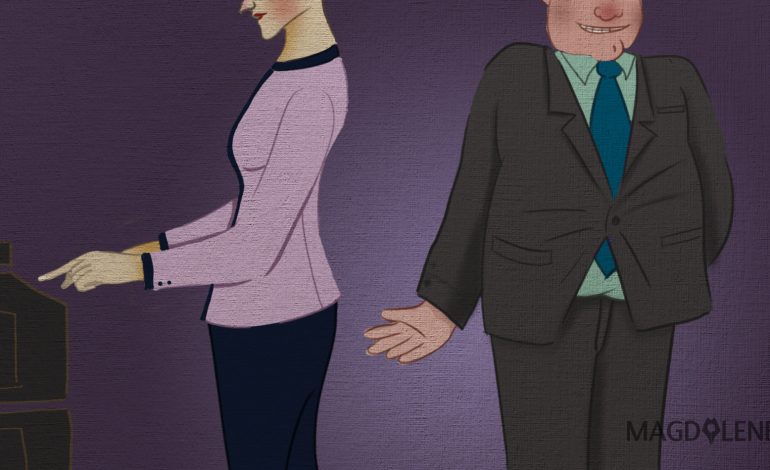Sexual Harassment at Work Harms Employment and Economy

With increased awareness on the prevalence sexual abuse, more women are encouraged to speak up about their experience, including in the workplace. But there is less consensus on how companies should act and the extent to which the government should intervene. The time has come for Indonesians to understand the detrimental implications of sexual abuse to survivors, the economy and nation, and the need to advance important changes to prevent sexual violence and harassment.
Recently, the social media world has been rocked by the revelations of sexual harassment and assault survivors, particularly those involving prominent figures. Some openly came forward while others decided to stay anonymous for understandably safety reasons. Weak law enforcement and fear of being stigmatized or even victim-blamed hold back many survivors, especially women, from fully standing up for themselves. Moreover, there is little guarantee that justice will win out and that their efforts will make a difference.
While the existing Labor Law addresses sexual advances in the workplace as a severe offense, it does not explicitly state the punishment for the perpetrators. The Ministry of Manpower has also issued guidelines for the prevention of workplace harassment, but they remain inadequate to eliminate sexual violence in various work settings.
A survey conducted by Never Okay Project and Scoop Asia in 2018 asserts that 96 percent of all female respondents in Indonesia have experienced sexual harassment in the work environment, while 77 percent of male respondents encountered it. Thus, women are more vulnerable to sexual harassment in the workplace. The type of harassment varies from verbal, gestures, written to visual. However, 36 percent of the observed companies do nothing, and only 19 percent have internal regulations regarding sexual harassment.
Also Read: Sexual Harassment at Workplace Moves to the Virtual World amid the Pandemic
Even remote working setup during the Covid-19 pandemic does not prevent sexual abuse. The latest Never Okay Survey found that among 315 respondents who worked from home, as many as 86 respondents were victims of sexual harassment, 68 respondents admitted to witnessing sexual harassment, and 30 respondents had been victims and witnesses of sexual harassment. The revelations have raised questions about the impacts on survivors and the effects on employment and the economy.
Harassment is enabled by power imbalance. In many circumstances, the victim is in a lower level with more menial or marginal capacity, while the harasser is in a higher or even authority position. This means if corporate policies on sexual harassment are in place, the unseen power dynamic, along with unsupportive organizational culture, can hamper policy enactment.
Furthermore, the impacts of sexual harassment on the workers are harrowing. According to the same survey by Never Okay, most victims will avoid certain work situations. Some admit to feeling insecure, lacking focus on work, having mental issues and decreased productivity. This condition, coupled with long, complicated protocols to file a complaint, may discourage workers from reporting, choosing to resign instead.
Sexual harassment at work engenders involuntary unemployment, a condition in which a person cannot get a job even though the salary is reasonable. Numerous studies in labor economics have also corroborated that sexual harassment in the work environment decreased job satisfaction and resulted in women leaving the work environment. A woman who gets offered a job as an assistant chef at a bar with a late-evening shift, for instance, may turn down the offer because of the risk of workplace harassment. In this case, she has chosen to remain unemployed involuntarily due to the presumably high-risk environment.
Involuntary unemployment could result in a permanently high unemployment rate, which could harm the economy. The market itself hardly solves this condition, so solving the problem requires government intervention. A study on gender gap in families, healthcare and industry published in 2011 in The American Economic Review incorporates sexual harassment in the labor economics model as a form of discrimination in work. It is necessary to include the risk in calculating workers’ salaries, especially for women, as they are more vulnerable to sexual harassment. This risk is usually associated with providing additional benefits, such as separate rooms, shuttle facilities, or taxi vouchers that can compensate for the risks faced by female workers.
Also Read: Ruang (Ny)aman: How to Handle Sexual Harassment in the Workplace
Some argue that the law on sexual harassment, which requires companies to provide safe space for women or other related benefits, will increase the cost for women to enter the labor market. However, another study on how sexual harassment exacerbates gender equality proves otherwise. Conducted by Toulouse School of Economics scholars, the study finds that men are generally potential perpetrators of sexual harassment in companies. Hence, the company’s costs to provide benefits to female employees can be borne by all employees, both male and female. Secondly, preventing sexual harassment can increase the productivity of female workers and male workers who have been victims of sexual harassment or uncomfortable with the treatment experienced by their colleagues. Finally, the law on sexual harassment in the workplace can eliminate the patriarchal culture, a significant barrier to women’s empowerment.
Substantive actions to stop workplace sexual harassment require a transformative approach underpinning social norms change with multi-sectoral interventions. The work setting can be one entry point for the change. Once established, decent working culture upholding equality and respect may create a spill-over effect to a broader societal level. Efforts should not stop at raising awareness. It must be continued by facilitating safe space, building prevention skills, enforcing company policy, and establishing accessible and convenient complaint procedures regarding sexual harassment.
Equally important, government interventions are pivotal to protect women’s rights to feel safe in the working environment. There must be a robust policy framework to prevent and handle sexual violence cases and provide victim’s recovery. For that reason, Sexual Violence Eradication Bill (RUU PKS) should be immediately passed, fostering a shared responsibility between the community and the government, and above all, the whole nation.






















